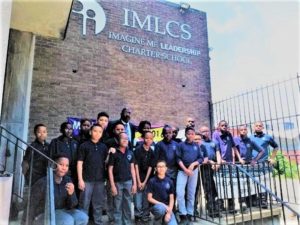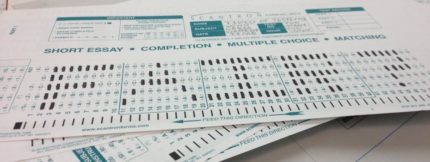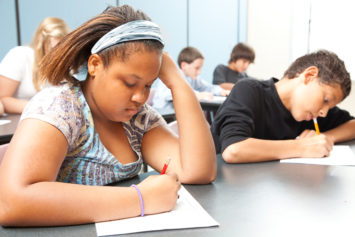
Under the direction of teacher George Leonard, 12 of the 18 Imagine Me Leadership Charter School students passed the Living Environment Science Regents exam. (Image courtesy of Tachelle Wilkes)
Standardized tests can be a nerve-racking experience for any student, but a rigorous exam typically reserved for high school students was no match for a group of bright fifth-graders at the Imagine Me Leadership Charter School in Brooklyn, N.Y.
Eighteen 10- and 11-year-old boys, appropriately dubbed the “Talented 18,” went into test mode as they sat eagerly to take the Living Environment Science Regents exam earlier this year. The test assesses students’ knowledge of all things science, from the make up of a stable ecosystem to biological processes like mitosis.
The pressure was on to pass the exam, however, as it’s required to graduate high school in the state of New York. That’s why George Leonard, director of curriculum and instruction at the charter school, worked so hard to ensure his young students were prepared to take the challenging exam.
“Students are struggling with the environment curriculum in the ninth grade because of the way they were prepared when they were in K through seventh [grades],” Leonard said. “They didn’t bridge it. Before this, the test was called the Biology Regents and it was even more difficult. So, they diluted it.”
Leonard went on to note that although the exam isn’t as rigorous as it once was, students are still failing in high numbers because of the way they’re taught the material in high schools and some middle schools. However, he and other leaders at the all-boys charter school in East New York have made it their mission to provide a positive learning environment that aids young boys in becoming responsible citizens and successful students in high school, college and beyond.
The Talented 18 took the exam at Boys and Girls High School in classroom 329 — the same place where Leonard first taught Regents Biology as a first-year teacher in 1981. As an instructor at P.S. 9’s Science Skills Center, the seasoned teacher prepped third- through sixth-grade students for the Biology Regents exam for six years straight. One of the youngest pupils to pass the Living Environment Science Regents under Leonard’s instruction was just 8 years old, according to a press release.
Leonard said he didn’t veer from his usual strategy when it came to preparing his new batch of students for the exam. A year prior, Leonard and charter school principal Bevon Thompson selected a pilot group of eight fourth-graders for the program, five of whom successfully passed the exam. Leonard then began preparing his pupils as if they were in high school.
To achieve the best results, Leonard and Thompson also decided to make the program longer and more rigorous.
“In some cases, I’m even more intense with the younger students because they’re more receptive at that age,” Leonard said. “They pay attention more. … You can be much more demanding [and], because they’re still learning about life during that time of their lives, these students are actually stronger and not as difficult to encourage.”
Students are only required to take the exam once, but if they take it before the ninth grade, they must score at least an 80. Leonard said some of his students scored in the high 70s, adding that even if they had scored an 80 or above, he would encourage them to re-take the test in the eighth or ninth grades.
After a final push of motivation, the Talented 18 took the Living Environment Science Regents exam on June 14. Twelve of the 18 fifth-graders passed the exam, an impressive feat for such a large group of students.
For young learners Allen Greene and Damani Williams, both 10, the exam was relatively easy but still had its challenges.
“The hardest part of the exam was the multiple choice,” said Williams, an aspiring surgeon. “With the multiple choice, you really don’t know what to expect, but you have to be ready. The easier part was the written questions because [with] writing, you have more understanding and you have more time to do it.”
Greene, who wants to be a scientist but hasn’t decided what kind yet, agreed with his classmate. He said he wasn’t at all intimidated by the idea of taking the high school-level exam since he’d already taken it once before.
“I felt like I was pretty prepared since this was my second time, and I knew what to expect,” Greene said. “I felt I was ready for the test and believed I would do really well on it.”
Both students also said they felt the exam helped prepare them for their prospective careers. For instance, Williams said the exam prepped him for his career as a surgeon because he had to complete 15 labs and one of them was a dissection.
Though the majority of the students passed the test, Leonard said he plans to utilize more-rigorous strategies in the future to ensure more, if not all, of the boys pass it the next time around. He said he would have the boys come in on more Saturdays to study and would put more focus on the written-response portion of the exam. Lastly, Leonard said he would have the students spend a 12-hour session with him — 9 a.m. to 9 p.m. — for two consecutive Saturdays before they tackle the exam.
“These guys are very mature, you can tell by their answers,” he said. “So, it takes more than just an academic skill set — it takes a child that’s mature and is hungry for doing well.”
The Talented 18 are Alexander Adames, Marquise Alleyne, Christopher Battle, Levi Bennett, Jordan Blake, Tristan Dildy, Allen Greene, Kevin Kearney, Preston Kittrell, James Livingston, Jahisie Lopez-Soto, Joseph McMichael, Tekhi Robinson, Sterlin Rutherford, Thierry Smith, Nathan Solar, Christopher Underwood and Damani Williams.


